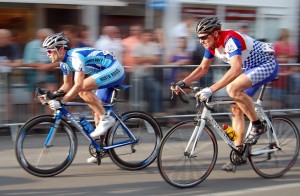Social Psychology – Competition Studies
Answers the Question
How does the presence of other people affect us as individuals?
How it Began
Norman Triplett’s competition studies started as a research thesis during his studies as a master’s student. Curious about the results of analysis of competitive cycling results which demonstrated that lone cyclists against the clock were always slower than cyclists riding or racing with a group of others, Triplett took to experimenting in the laboratory with children and fishing reels. The result was “The dynamogenic factors in pacemaking and competition” which was published in the American Journal of Psychology in 1898. 110 years on this is considered to be the seminal work for the development of sports psychology.

Social Psychology was in its infancy when Triplett was a student. Early research focused on basic perceptual processes and judgements, with social factors soon starting to be included in researchers considerations. Despite lacking statistically significant evidence for competition effects, the research did support the notion that the presence of other people does impact the motivation of the individual.
The publication opened the floodgates for the body of knowledge that is now available to us in the field of social psychology
Key Terminology
Social Facilitation – Tendency for the presence of other people to enhance our performance on simple or well-learned tasks, but reduce performance on complex, or unfamiliar tasks (Geen, 1991; Zajonc, 1965)
Social Loafing – Tendency for individuals to reduce their efforts when working with others on group or collective tasks (Latané et al., 1979)
In Brief
“Social facilitation and social loafing might appear to be opposite effects because the presence of others typically stimulates effort in the case of facilitation but reduce it in the case of loafing. However, this inconsistency is readily resolved by noting the nature of others present are observers, co-actors or audience members, creating the potential for increased arousal, evaluation or distraction relative to what would be experienced alone. On the other hand, in social loafing research, the others who are present are co-workers or teammates, creating an opportunity for individuals to reduce their efforts tow hat they might contribute when solely responsible for performing well at the task.” (Karenau and Kipling, 2012)
What does this mean for Organization Development?
The role of social facilitation is important to consider in the workplace because an Organization is a social situation. Social facilitation implies that people’s performance is not purely based on their ability, but is also impacted by the internal awareness of being evaluated. Understanding that the presence of an observer or a line manager whilst someone is performing a task is important because Performance can be greatly affected by situation factors, thus making it possible to entirely alter the outcome of a situation.
This can be very important when considering how anyone will perform under evaluation and how to potentially prepare for those situations. For example, allowing an individual to practice delivering a presentation in front of peers before delivering it for ‘real’ will help reduce the feeling of evaluation when the individual delivers the presentation for real and increase performance. On the other hand, the use of assessment centres for recruitment purposes can significantly distort performance according to how the individual responses to the feelings of evaluation and whether they enhance or reduce performance.
Social loafing is consider to be one of the main reasons groups are sometimes less productive than the combined performance of their members working as individuals, although this should be separated from group coordination problems. Social loafing helps explain an individual’s reduction in effort in order to avoid pulling the weight of a fellow group member, many of the causes of this reduction in effort stem from an individual feeling that his or her effort will not matter to the group.
